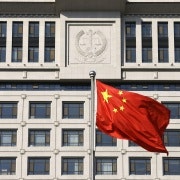China's new leaders crack down
As the new leadership further consolidates its grip on power, three significant announcements have been made in the past week underscoring the leadership’s growing political confidence and willingness to tackle some of the big challenges facing China. These have been continuing to crack down on corruption and abuse of Party power and privilege, addressing municipal indebtedness, and correcting some of the imbalances created by state-owned enterprises’ easy access to credit (which has resulted in overcapacity in key industries).
On July 25, the trial was announced of former Chongqing Party Secretary and one-time leadership aspirant Bo Xilai. He is to be tried for fraud and abuse of official power. The “abuse of power” charge may be a reference to an alleged official cover up of the murder of Englishman Neil Heywood by Bo’s wife, Gu Kailai. She was convicted for this crime in August last year. It may also refer to Bo’s so-called “anti-mafia” campaign in Chongqing where he is accused of arresting businessmen and confiscating their property for his own gain under the pretext of a crack down on crime.
Once a defendant goes to trial, a guilty verdict is a given. The big unknown is whether Bo will plead guilty to any of the charges. As a proud ‘princeling’, who had been imprisoned and tortured during the Cultural Revolution, his pride may prevent him from pleading guilty and he may have the will to resist. Refusal to go along with what is a political trial has likely delayed its start until now. This is a real risk for the new leadership as a ‘not-guilty’ plea would be a rallying point for Bo’s supporters. That he has gone to trial now suggests a ‘guilty’ plea has been secured or that the leadership feels confident to manage the political fallout of a “not-guilty” plea.
Last week the government announced a five-year moratorium on the construction of government buildings that is supposed to be strictly enforced. This is part of the broader anti-waste and extravagance campaign directed internally, in the Communist Party. While welcome, much of the construction and waste has already occurred. Across China in the remotest of locations bizarre government and Party buildings crowd the landscape.
In Yinchuan, capital of Ningxia Autonomous Region, for example, the Party and government buildings are small-scale replicas of Washington’s Capitol building and other buildings around the Washington Mall. Even if they lack the democracy that Washington symbolises and embodies, it is interesting that the good officials of Yinchuan want its buildings.
Then on Sunday in a tersely worded announcement the National Audit Office said that it was told by the State Council to stop its other work and conduct a national audit of municipal government debt. This attests to the concern at the central government over the level of build-up of municipal government debt and the attention being given to it by international and domestic markets.
This is the second time that such a national audit has been conducted, but this time it would seem the new government is determined to address growth of municipal debt. Considerable uncertainty surrounds government debt levels in China, but debt does not seem to be as scary as many commentators suggest. As a share of GDP, measures of total government debt at all levels range from 40 to 50 per cent of GDP according to the IMF, much less than for many developed countries. Of this, municipal debt may be around half the total.
The issue is more one of the share of municipal debt that is non-performing or at least doubtful. The moratorium on government office construction suggests that concern over non-performing debt is driving the national audit and whatever policy responses ensue. One plan is for the central government to issue bonds to pay for continuing infrastructure expenditure – a necessary element in keeping growth in the 7 per cent plus range – while putting pressure on local governments to repair their balance sheets.
The third important announcement in recent days suggests the government may also be preparing to take on the state-owned enterprise sector. It has ordered a cut in the excess production capacity of nineteen key industries, including steel, non-ferrous metals and construction materials. Again, this is not the first time excess capacity has been targeted by the government, but it just may be that on this occasion the new team is determined to do something about it.
All of these are difficult areas and the previous leadership had tried to tackle these problems without success, but also without evident enthusiasm for the task. That the new team has put these on the policy agenda early in its term points to their acceptance that these are pressing problems that need to be addressed. It also highlights the new leadership’s confidence in its position politically. Reigning in municipal debt and excess capacity in the state-owned enterprise sector will be a major test of the new leadership’s reformist credentials. With Bo Xilai out of the way, they should have the political authority to be bold.
Dr Geoff Raby is chairman and chief executive of Beijing-based advisory firm Geoff Raby & Associates, and a former Australian ambassador to China. He is a Vice Chancellor's Professorial Fellow at Monash University and a member of the Board of Directors of Fortescue Mining Group and Yancoal Australia.
















